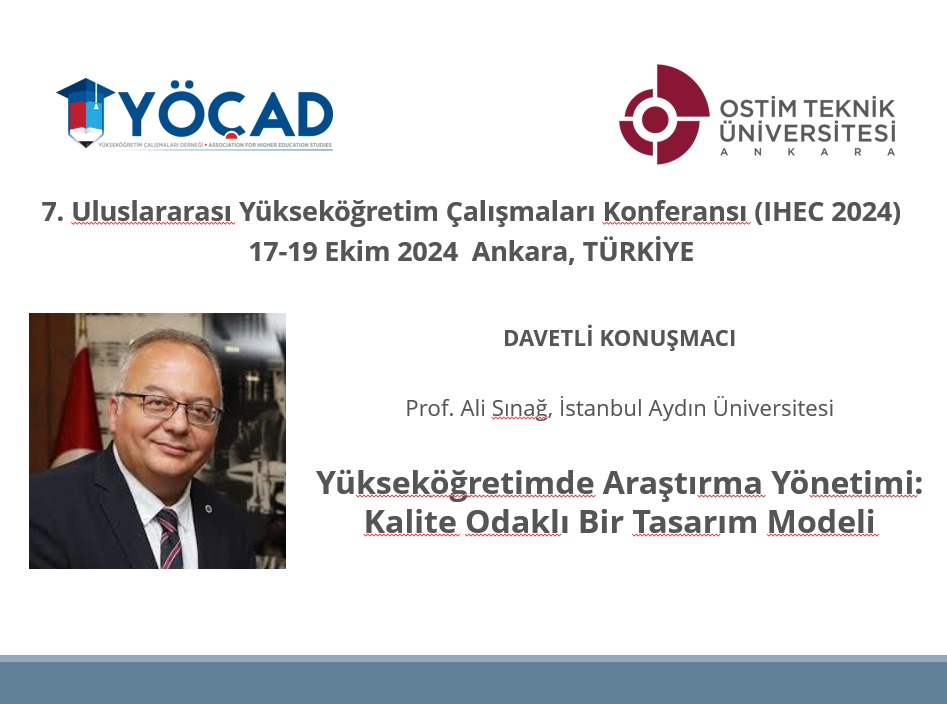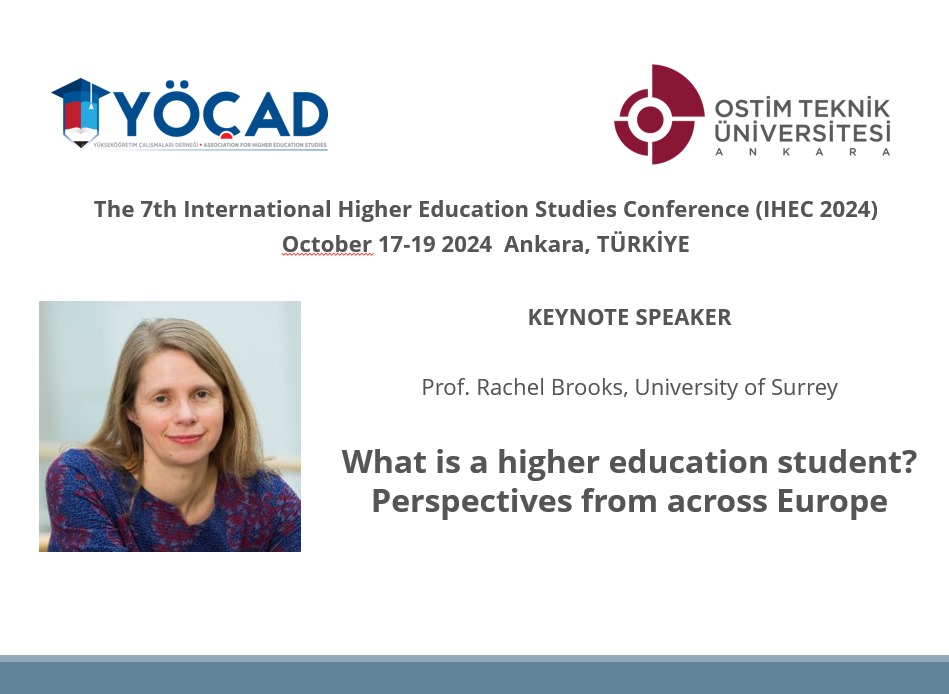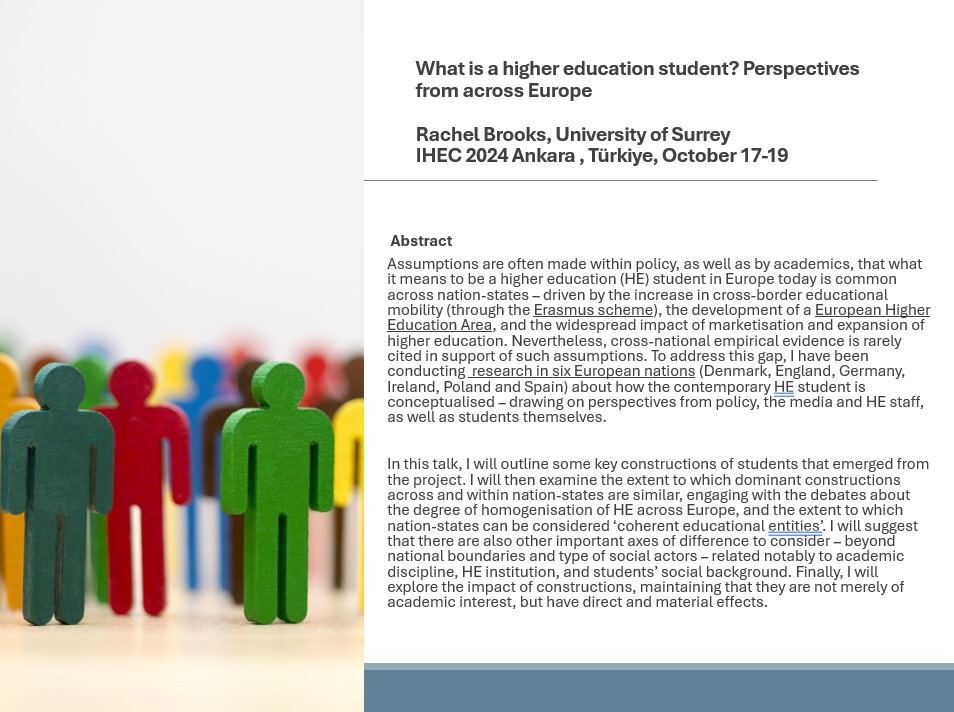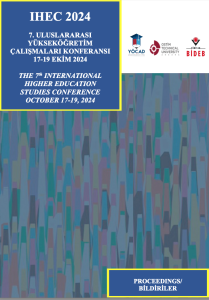IHEC2024 Guest Speakers
Prof. Dr. Ali Sınağ

Prof. Dr. Ali SINAĞ 1969 yılında İstanbul’da dünyaya geldi. Ankara Üniversitesi Fen Fakültesi Kimya Bölümünde Nisan 2001 yılında tamamladığı doktora çalışmasının ardından Alman Akademik Değişim Servisinden (DAAD) aldığı bursla 2001’den 2003’e kadar Almanya’nın Karlsruhe şehrinde bulunan Karlsruhe Teknik Üniversitesinin köklü enstitüsü Engler Bunte Kömür, Petrol ve Doğalgaz Enstitüsünde Çelik yüzeyinin sertleştirilmesi (AB Projesi FP 7) konusunda ardından da yine aynı şehirde bulunan Karlsruhe Araştırma Merkezinin bursuyla da 2003’den 2004’e kadar Karlsruhe Araştırma Merkezinde Biyokütleden değerli kimyasalların eldesi için katalizör sentezi konusunda doktora sonrası bilimsel araştırmalarda bulundu. Ekim 2003’te Yardımcı Doçent, Nisan 2005’de Doçent, Eylül 2010’da Profesör oldu. Çok sayıda idari görevde bulunan Dr. Sınağ 2012 – 2023 yılları arasında Ankara Üniversitesi Teknokent Yönetim Kurulu Üyesi ve Başkan Vekili, Ankara Üniversitesi Fikri Sınai Haklar Kurulu Başkanı ve Ankara Üniversitesi Kalite Koordinatörlüğü görevlerini yürüttü. Dr. Sınağ aynı zamanda Yüksek Öğretim Kalite Kurulu Dış Değerlendirme Takımlarında Değerlendirici Üye ve Takım Başkanı olarak 2016 yılından beri üniversitelerimizin dış değerlendirme sürecine katkı sunmaktadır. Prof. Dr. Ali Sınağ 2020 yılından bu yana TÜBİTAK Kömür, Biyokütle ve Atık Teknolojileri Çağrı Programları ile Yükseköğretim Kurulunu temsilen Türk Patent ve Marka Kurumu Danışma Kurulları üyesidir. Dr Sınağ TÜBİTAK İletişim Merkezi (TÜBİMER) Kurul üyesi olarak da 2022 yılından beri görev yapmaktadır. Eylül 2023’den beri İstanbul Aydın Üniversitesi’nde Araştırma ve Kalite süreçlerinden sorumlu Rektör Yardımcısı olarak görev yapan Dr. Sınağ’ın tamamlanmış ve yürütmekte olduğu çok sayıda ulusal/uluslararası TÜBİTAK projesi, 85 adet SCI ve SCI–Exp tarafından taranan uluslararası saygın dergide yayımlanan makalesi bulunmaktadır. Bu makalelere SCOPUS’a göre yabancı bilim adamlarınca bugüne dek 2800 civarında atıf yapılmıştır. Uluslararası ve ulusal kitap bölümleri ve biri uluslararası sekiz patenti bulunan Dr. Sınağ ileri derecede İngilizce ve Almanca bilmektedir
Prof. Dr. Rachel Brooks

I am currently Professor of Sociology and Associate Dean for Research and Innovation for the Faculty of Arts and Social Sciences. I have previously held roles as Head of the Department of Sociology (2012-16) and Associate Dean for the Doctoral College (2017-19). I am editor-in-chief of Sociology, an executive editor of the British Journal of Sociology of Education, co-editor of the ‘Research into Higher Education’ book series, a member of Governing Council of the Society for Research into Higher Education, and a member of ESRC Council. I was also a member of the education sub-panel for REF 2021.

IHEC2024 Committees
Organizing Board
- Prof. Dr. Armağan ERDOĞAN, Beykoz University
- Assoc. Prof. Dr. Elif BENGÜ, Abdullah Gül University
- Assoc. Prof. Dr. Gökçe GÖKALP, Middle East Technical University
- Dr. Mete KURTOĞLU, Middle East Technical University
- Dr. Mehmet ŞENGÜL, Hacı Bayram Veli University
- Research Assistant Şahabettin AKŞAB, Gaziantep University
- Tugay DURAK, University College London, UK
- Dr. Egehan Özkan ALAKAŞ, Ostim Technical University
- Dr. Büşra AĞAN, Ostim Technical University
- Lecturer Ayşe ATABEY, Ostim Technical University
Advisory Board
- Prof. Dr. Rachel BROOKS, University of Surrey
- Prof. Dr. Ömer DEMİR, Ankara Social Sciences University
- Prof. Dr. Mehmet DURMAN, Beykoz University
- Prof. Dr. Yüksel KAVAK, TED University
- Prof. Dr. Stan TAYLOR, Durham University, UK
- Prof. Dr. Metin TOPRAK, Sabahattin Zaim University
- Prof. Dr. Öktem VARDAR, Founder, TED University
- Prof. Dr. Murat YÜLEK, Ostim Technical University
Scientific Board
- Assoc. Prof. Dr. Duygun Göktürk AĞIN, METU
- Assoc. Prof. Seema ARIF, University of Management and Technology, Pakistan
- Assoc. Prof. Dr. Alim ARLI, Marmara University
- Assoc. Prof. Dr. Pınar AYYILDIZ, Ankara Medipol University
- Assoc. Prof. Dr. Sevinç Gelmez BURAKGAZİ, Hacettepe University
- Assoc. Prof. Dr. Melis CİN, Lancaster University
- Dr. Alper ÇALIKOĞLU, Nazarbayev University
- Assoc. Prof. Dr. Aylin Çevik ÇAKIROĞLU, TED University
- Assoc. Prof. Dr. Serap EMİL, METU
- Assoc. Prof. Dr. Hasan Yücel ERTEM, Zonguldak Bülent Ecevit University
- Assoc. Prof. Dr. Murat ESEN, İzmir Katip Çelebi University
- Dr. Tuncer FİDAN, Alanya Alaaddin Keykubat University
- Assoc. Prof. Dr. Deniz DERİNBAY GÜLMEZ, Necmettin Erbakan University
- Prof. Dr. Sedat GÜMÜŞ, Hong Kong Education University
- Prof. Dr. Karri HOLLEY, University of Alabama, USA
- Dr. Metin KARTAL, Kafkas University
- Prof. Dr. Natasha KERSH, University College London
- Prof. Dr. Zeynep KIZILTEPE, Boğaziçi University
- Prof. Dr. Yaşar KONDAKÇI, METU
- Prof. Dr. Türker KURT, Gazi University
- Assoc. Prof. Dr. Ömür Hakan KUZU, Selçuk University
- Assoc. Prof. Dr. Vijay Kumar MALLAN, University of Otago, Australia
- Prof. Dr. Suphan NASIR, Istanbul University
- Dr. Maissam NIMER, Özyeğin University
- Dr. Yusuf İkbal OLDAÇ, Hong Kong Lingnan University
- Dr. Feride ÖKSÜZ GÜL, İstanbul Medeniyet University
- Prof. Dr. Saime ÖZÇÜRÜMEZ, Başkent University
- Prof. Dr. Şükrü Oğuz ÖZDAMAR, Zonguldak Bülent Ecevit University
- Dr. Tom PARKİNSON, University of Kent
- Prof. Dr. Mustafa POLAT, Ostim Technical University
- Prof. Dr. Fatma Nevra SEGGIE, Boğaziçi University (retired)
- Prof. Dr. Ahmet SELAMOĞLU, Fenerbahçe University
- Dr. Harun SERPİL, Anadolu University
- Prof. Dr. Ünsal SIĞRI, Ostim Technical University
- Prof. Dr. Ali SINAĞ, Istanbul Aydın University
- Prof. Dr. Funda SİVRİKAYA, Istanbul Aydın University
- Assoc. Prof. Dr. Gülşah TAŞÇI, İstanbul 29 Mayıs University
- Assoc. Prof. Dr. Adem YAMAN, Çanakkale University
IHEC2024 Theme
Higher Education Agenda and New Generation Universities in the New Century of the Republic
There is a general consensus that universities have undergone profound transformations in the 21st century. This period is simultaneously marked by economic and political crises, technological advancements, regional and global migration, the climate crisis, natural disasters, and pandemics—all of which represent significant global changes. These societal, economic, political, psychological, and technological shifts are inevitably altering the demand for and expectations placed on universities. The competition is rapidly intensifying, and issues such as student experience and satisfaction, the quality of universities, and their standings in global rankings are increasingly prominent in debates. Furthermore, a global reduction in resources allocated to higher education is compelling changes in budget and resource management. Ecological changes, such as climate change, natural disasters, and similar factors, are also impacting the operations of higher education institutions, leading to transformations in numerous areas including university locations, building maintenance, energy usage, and resource management. This means that environmental concerns should be given as much importance in managing and making policies for higher education as other types of changes, especially from a sustainability standpoint. In addition to generating knowledge, universities must also transform to create value from this knowledge, facilitate their graduates’ employment through collaborations with industry and various sectors, and ensure their institutional survival. While the causes, reasons, scope, and outcomes of these changes display a global commonality, they also vary according to regions, countries, and institutions.
Additionally, social, cultural, and demographic changes within societies are also impacting higher education institutions. Demographic shifts and diversity are prompting these institutions to develop new policies to meet the evolving needs of students, offering interdisciplinary programs, experiential learning opportunities, career development pathways, and extracurricular activities. In recent years, the Covid-19 pandemic led to the closure of universities in many countries and a shift to remote education. As a result of this transition, higher education institutions have enhanced their experiences with remote management and online education and have developed new practices. Advances in information technology, particularly in areas such as artificial intelligence, big data, and virtual reality, are progressing rapidly. These advancements are enriching students’ learning experiences while also affecting the ways in which teaching, research, and administration are conducted.
In the light of this, we are pleased to announce the IHEC 2024 Conference, to be hosted by Ostim Technical University. This conference is designed to bridge perspectives from the past to the future and from national to international contexts, celebrating the centennial of the Republic and embracing the ethos of a new generation university. At this significant historical juncture, as the Republic of Türkiye marks 100 years, we wanted to provide a platform for discussions and analyses on what missions universities, which assumed a pioneering role in social change and development in their early years, will have in the next century. We invite you to share and discuss your views on higher education, your research, and your publications within the framework of these topics at the IHEC 2024 Conference. Since 2015, the IHEC Conferences we have organized as an association have provided a platform for high-quality contributions to the national and international themes, topics, and areas of discussion in higher education. We look forward to your contributions to make it a meeting and discussion platform for academics, researchers, and students from various disciplines working in the field of higher education studies. You can submit your applications under the main theme of “Higher Education Agenda and New Generation Universities in the New Century of the Republic” for the sub-themes listed below, or you can also send proposals for topics not listed here.
We look forward to seeing you at the IHEC 2024 Conference on October 17-19, 2024, which, in addition to academic discussions, offers the opportunity to explore the urban culture, history, and social life of the capital during the centennial year of the Republic.
Conference Themes
Current Themes and Debates in Higher Education
- Digitalization and Artificial Intelligence
- Micro-credentials and Flexible Learning
- Internationalization and Localization
- Ethics, Principles, and Values in Higher Education
- Academic Freedoms and The Autonomy of Universities
Past, Present, Future: Higher Education in Türkiye on its 100th Anniversary
- The Mission, Vision, and Role of Higher Education
- Higher Education Systems and Management
- Massification of Higher Education and Quality Processes
- Financing and Sustainability of Higher Education
New Generation Universities
- Entrepreneurship, Community Contribution, Development, Sustainability
- University and Industry/Business Collaboration
- University and City Relationships
Key Actors/Stakeholders in Higher Education
- Responsibilities and Decision-Making Processes of Administrators
- Development, Career Processes, and Expectations of Instructors
- Well-being and Mental Health of Individuals in Higher Education Institutions
Student Perspectives in Higher Education
- Access to Higher Education, Equality of Opportunity, Diversity, Inclusion
- Changing Student Profiles and Needs in a Changing Social Structure
- Academic and Social Expectations and Conditions of Students
- Graduate Tracking Systems and Employment Policies
Young Researchers Session at IHEC 2024
The Young Researchers Session, which we initiated at the 6th International Higher Education Studies Conference (IHEC), will continue at IHEC 2024. The conference will feature special sessions designed for researchers who are early in their careers in the field of higher education. These sessions will be held on the same days as the main conference.
Organizing Committee
- Tugay Durak, University College London (UCL)
- Dr. Yusuf İkbal Oldaç, Lingnan University
- M. Furkan Uzan, University of Southampton
- Dr. Mete Kurtoğlu, Middle East Technical University
Who can attend the Young Researchers sessions?
These sessions are open to undergraduate, master’s, and doctoral students interested in higher education studies.
Why should I attend the Young Researchers session?
By participating, you will share your academic work with other early-career researchers and receive valuable feedback from experienced higher education researchers that can help advance your work. You will also have the opportunity to closely get to know other young researchers in the field, laying the groundwork for future academic collaborations. Lastly, you will have priority access to limited-capacity events specifically organized for young researchers, such as overseas experience sharing, academic writing workshops, etc.
Participants in these sessions will have the right to attend other sessions at the main conference and will receive the same certificate as other main conference attendees at the end.
How can I participate?
You can submit your paper for evaluation via the “paper submission” link on the homepage of the 7th International Higher Education Studies Conference. When uploading your paper, select the “Young Researchers Session” form. You must also upload a document proving your student status.
Can I attend without presenting?
Participants who provide proof of being a student and pay the reduced listener conference fee can attend the sessions as listeners.
Will any awards be given?
Yes! One individual (or one presentation group) among those who present at these sessions will receive the “Young Researchers Award.” The award will be based on the cumulative assessment of the presentation and the submitted application text.
IHEC2024 Call for Abstracts
Participation Types
Oral Presentation (15 minutes)
Oral presentations typically cover completed or nearly completed research. Researchers will present their work and then respond to any explanatory feedback and questions from the audience and session chair. Presenters should be careful with their time allocation, and session chairs may adjust the timing based on the number of presentations. Each oral presentation will be planned for 15 minutes.
Abstract for Oral Presentation: The abstract should be between 500-750 words, excluding references, and include the following sections:
- Description of the problem,
- Aim of the study or Research question(s),
- Conceptual/Theoretical Framework,
- Research Method (for empirical work),
- Findings (preliminary findings for work in progress)/Discussion points, and
- Conclusion.
Guidelines for Authors
The conference languages are Turkish and English. Those who submit abstracts in English are required to present in English.
IHEC 2024 is a peer-reviewed scientific conference. All submitted papers/symposiums will be evaluated by at least two expert reviewers within the framework of a double-blind review process. Acceptance or rejection decisions will be based on the reviewers’ evaluations.
Participants of jointly authored works must each pay the participation fee to attend the conference. A participant may present a maximum of two papers, and an author’s name may appear in up to three papers.
To be included in the conference program, registration must be completed by September 25, 2024.
IHEC2024 Publication Process
Participants may choose to publish the papers presented orally at the conference either in the YÖÇAD Full Text Proceedings Book (in Turkish or English) or in the Higher Education Governance & Policy (HEGP) published under YÖÇAD, subject to the peer review process.
Below are details regarding the publication processes:
(1) Full Text Proceedings Book process conducted by YÖÇAD:
The deadline for submitting full texts in Turkish or English for the Proceedings Book is November 1, 2024. Full texts prepared should be submitted in the specified format to yocad.ihec@gmail.com as a Word document. Submitted Full Text Papers by participating authors will be sent to print following the approval of the book editors, after the authors have completed the suggested revisions.
Full Paper Book Format
You can reach the full paper book format in this link. (PDF)
You can download the full paper book format from this link. (docx)
(2) Journal process conducted in collaboration with the Higher Education Governance & Policy (HEGP):
The Higher Education Governance & Policy (HEGP) will be published in English. Papers presented in Turkish at the conference can also be published in this journal if translated into English. The journal’s regular annual publication process will be operated. The deadline for submitting texts in English is November 1, 2024, and details of the publication process can be accessed via the following links:
– Journal website: https://dergipark.org.tr/en/pub/hegp
– Journal submission guidelines: https://dergipark.org.tr/en/pub/hegp/writing-rules
– Journal indexes: https://dergipark.org.tr/en/pub/hegp/indexes
The printing of the articles will depend on the decisions made at the end of the peer review process conducted by the journal editors after the author’s conference participation is confirmed.
IHEC2024 Registration
Certificates of Participation will only be issued to those who register and attend the conference.
Early-bird Registration (July 24, 2024 – August 24, 2024)
| Faculty Members | Students | For Non-Presenters |
| 150 USD | 75 USD | 50 USD |
Late Registration
Registration fees for presenters are valid from August 25, 2024, to September 25, 2024.
Listeners can register until October 15, 2024 (Important: Please refer to the notes section for certificates).
| Faculty Members | Students | For Non-Presenters |
| 250 USD | 125 USD | 75 USD |
Notes
- Participants who want a certificate to be issued on their behalf as a listener should register by September 20, 2024 at the latest.
- The last registration date for non- presenters who do not request a Certificate of Attendance is October 14, 2024.
Payment
All bank charges and commissions are paid by the participants.
Bank Account (USD)
Account Name: Yükseköğretim Çalışmaları Derneği
Bank : Garanti Bank
Branch : Pendik
Branch Code: 137
City : Istanbul
Account Number : 9072493
IBAN : TR89 0006 2000 1370 0009 0724 93
Swift Code: TGBATRISXXX


